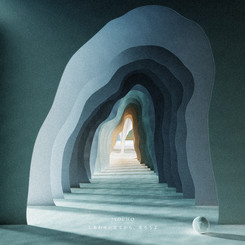Review
by Nicholas Dupree,Let's Promise to Be Happy Album
JYOCHO
| Synopsis: |  |
||
Indie rock band JYOCHO's new full-length album, Let's Promise to Be Happy debuted on February 16. The Kyoto-based quartet includes Uchu Conbini veteran Daijiro Nakagawa, vocalist Netako Nekota, flutist Yuuki Hayashi, and bassist sindee. Nicholas Dupree checks out their new eight-track album, including the track "All the Same" featured as the ending theme in the Banished from the Heroes' Party anime series. |
|||
| Review: | |||
JYOCHO first caught my ear last year when their single, “All The Same” was used as the ending theme to Banished from the Hero's Party. It was a sedate, yet intricately instrumented track that perfectly captured the idyllic, contented vibes of that story almost better than the actual show. It was such a striking track that I immediately started listening through their catalog on YouTube, and found a whole host of songs with that same ethereal combination of jangly guitar, woodwind accents, and hypnotic percussion. Much to my surprise, I found out the project was started by Daijirō Nakagawa, who I mostly know through his previous band Uchu Conbini, a band I followed years ago but had largely lost track of. Now, a few months later, I'm getting to cover this new eight-track release Let's Promise to Be Happy. Though, that tracklist is a bit deceptive. The first and final tracks—“New Reminiscenes” and “Never Forget”—are about 30 seconds apiece, and act as simple intro and outro to the songs they surround. Taken together, Let's Promise to Be Happy is a concise six tracks, and while they each have their own subtle eccentricities, the overall production and structure are pretty uniform. That's both a strength and a weakness for the album as a whole, as while there are individual musical moments that stay in the memory, no one song sticks out from the others when listening together. Granted, that means the entire listening experience is rock-solid and cohesive, and that's perfect for the kind of graceful, tranquil indie rock JYOCHO are delivering here. True to the band's name, their music is all about mood and atmosphere, and works best when you just close your eyes and let it wash over you. That's perhaps where the short length hurts it a little, as the serene sound is at its best when you can soak it in for a good long while. Thankfully, everything here holds up to repeat listening sessions beautifully, so setting the album to loop is plenty conducive to vibing for however long you can get away with. It's through those repeated listens that a lot of the charm of the music makes itself known. Founder and guitarist Daijirō Nakagawa has long established himself in the niche of mathrock, and he's brought that same level of guitar work here, layering in riffs as energetic and graceful as they are technically impressive. But even if you're not into midwest emo/mathrock, the soft touch of the other instruments—and Netako Nekota's lilting vocals— serve to both complement and temper those fast fingers, creating a soundscape that evokes the feels and smells of a warm spring day. Track five, “Turn into the Blue” especially channels that energy, drifting through an almost ephemeral sequence of musical ideas that only got better the more times I heard it. In describing this album, the band says that the thematic underpinning of it all was this: “Do we really want to be happy?...As we seek happiness, things that are not happy are born within us.” That contemplative and melancholy tone is present throughout, even without fully understanding the lyrics. The blend of wistful hope and tentative fear tinge the mix of each track, highlighted as the percussion steadily grows heavier and fuller across the runtime, driving each song forward in subtle but precise moments. It's again something that becomes more apparent on repeat trips, and evidence of the strong backbone for the entire project. No one element or instrument is doing all the work, instead all working in concert to channel a quiet but powerful feeling by the end of “Measure of Dawn.” In all, this is just a really arresting album if you're willing to get on its wavelength and perhaps give it more than a cursory sample. It's best taken together as a single, cohesive essay rather than individual paragraphs, but each track stands perfectly well on its own. If you heard “All The Same” as a TV edit, you at the very least owe yourself a listen to the full single, and perhaps that can open the gates for you. |
|
The views and opinions expressed in this article are solely those of the author(s) and do not necessarily represent the views of Anime News Network, its employees, owners, or sponsors.
|
| Grade: | |||
Overall : A-
+ Fantastic production and instrumentation, overall firm grasp of atmosphere |
|||